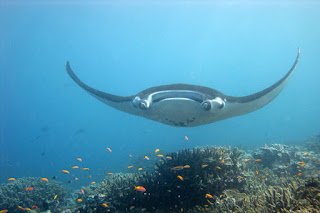1. California Fights Offshore Drilling Plan
“California’s plan to deny pipeline permits for transporting oil from new leases off the Pacific Coast is the most forceful step yet by coastal states trying to halt the biggest proposed expansion in decades of federal oil and gas leasing.” “I am resolved that not a single drop from Trump’s new oil plan ever makes landfall in California,” says Lt. Governor Gavin Newsom, chair of the State Lands Commission and a Democratic candidate for governor of California.
Read More...
---------------------------------------------------
2. Coral Reef Tourism Threatened
 “Coral reef tourism has a global value of US $36 billion per year, according to a scientific study mapping the global value and distribution of coral reef tourism. This study, published in the Marine Policy journal in August 2017, concluded that 30 percent of the world’s reefs are valuable to tourism.” Coral bleaching, ocean acidification, and sea level rise leading to coastal erosion and pollutants entering coral reefs are some of the threats to coral reefs (and their tourism value) today.
Read More...
---------------------------------------------------
“Coral reef tourism has a global value of US $36 billion per year, according to a scientific study mapping the global value and distribution of coral reef tourism. This study, published in the Marine Policy journal in August 2017, concluded that 30 percent of the world’s reefs are valuable to tourism.” Coral bleaching, ocean acidification, and sea level rise leading to coastal erosion and pollutants entering coral reefs are some of the threats to coral reefs (and their tourism value) today.
Read More...
---------------------------------------------------
---------------------------------------------------
4. Whales and Sharks at Risk From Microplastics
2. Coral Reef Tourism Threatened
 “Coral reef tourism has a global value of US $36 billion per year, according to a scientific study mapping the global value and distribution of coral reef tourism. This study, published in the Marine Policy journal in August 2017, concluded that 30 percent of the world’s reefs are valuable to tourism.” Coral bleaching, ocean acidification, and sea level rise leading to coastal erosion and pollutants entering coral reefs are some of the threats to coral reefs (and their tourism value) today.
“Coral reef tourism has a global value of US $36 billion per year, according to a scientific study mapping the global value and distribution of coral reef tourism. This study, published in the Marine Policy journal in August 2017, concluded that 30 percent of the world’s reefs are valuable to tourism.” Coral bleaching, ocean acidification, and sea level rise leading to coastal erosion and pollutants entering coral reefs are some of the threats to coral reefs (and their tourism value) today.
3. States Choose Wind Energy Over Offshore Drilling
Atlantic states that are protesting Trump’s plans for more offshore drilling are increasingly turning towards wind energy. “New Jersey Governor Phil Murphy announced that his state will aim for 3,500 megawatts of installed offshore wind by 2030, enough to power 1 million homes. Massachusetts has a goal to build 1,600 MW of offshore wind power by 2027, and New York has committed to 2,400 MW by 2030.”
Read More...
Filter feeding marine animals such as baleen whales and whale sharks are increasingly at risk from microplastic pollution a new study says. “Taking in microplastic can block their ability to absorb nutrients, and may have toxic side-effects. Microplastic contamination has the potential to further reduce the population numbers of these species, many of which are long-lived and have few offspring throughout their lives.”
Read More... 5. Giant Manta Ray Listed As Threatened Under Endangered Species Act
The National Marine Fisheries announced that the giant manta ray is now listed as threatened under the Endangered Species Act. The giant manta ray can have a wingspan of up to 29 feet and is a gentle giant that feeds only on plankton. They are highly migratory and slow to grow and reproduce. One of their main threats is fishing for their gill rakers, which are used in a controversial formula of Traditional Chinese Medicine.
Read More...
---------------------------------------------------
Be sure to "LIKE" http://facebook.com/SeaSave to ensure our "Week in Review" is delivered to your newsfeed every Friday.
Sea Save Foundation is committed to raising awareness of marine conservation. The Week in Review is a team effort produced by the Sea Save staff to provide a weekly summary of the latest in marine research, policy, and news.



